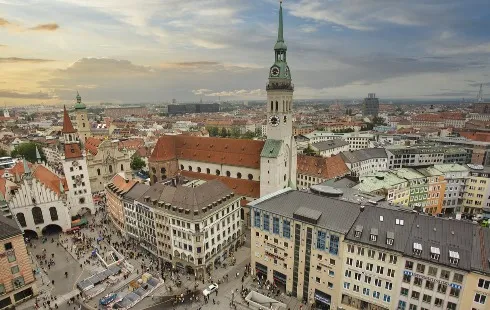
Gonadorelin Peptide: A Gateway to Understanding Endocrine Dynamics
Section: Science
September 26, 2021, will mark the 20th postwar era election of the German parliament. Ordinarily, people do not turn to German elections for fun and excitement. But this year's elections are set to have wide-ranging and novel impacts on the German citizens, the German economy, and the country's European neighbours.
The primary effect of the upcoming elections is that Chancellor Angela Merkel will be stepping down after spending 16 years at the epicenter of European politics. It is difficult for the citizenry - and the rest of the European continent - to conceive of a Federal Republic of Germany without Chancellor Merkel at its helm. Merkel guided Germany through several key events, including the global recession and more recently, immigration and integration issues.
Merkel's most memorable legacy will be the way she held the European Union together over a ten-year span in which no one expected the Union to weather the challenges it was facing. The next chancellor has some big shoes to fill - replicating Merkel's unwavering leadership style in the face of quasi-chaos will not be easy.
When the time comes to vote, the German people will have to decide if they wish to continue along the path Merkel has forged; or, if another way is needed, thus beginning a new adventure.
There is much talk of the possibility of the Green party taking the lead in the elections. A government led by this party would usher in radical change for the country and could meet with acceptance and enthusiasm from the populace. Merkel's cabinet pledged that by 2045 Germany would drastically reduce its carbon emissions. Promises like this lay a good foundation for future climate-conscious governments. As environmental awareness grows more popular, it behoves national governments to incorporate these issues into their policies.
Responding well to the pandemic is a factor that German constituents will consider when voting time comes around. Once famously austere in its fiscal policies, Germany's response to the coronavirus crisis was to go into debt so that the government could absorb the worst fiscal effects that the virus had on the economy. By shielding its populace in this way, Germany showed itself to be a capable and compassionate European leader.
Manifestos presented by the various political parties in Germany demonstrate that the country does not only think of the wellbeing of the German people. Instead, Germany carefully considers how its policies will affect the rest of the European continent.
Consequently, regional sentiment toward Germany is almost unanimously positive. Angela Merkel's leadership style has had a constructive influence on the continental opinion about Germany. Most European citizens believe that Germany can competently lead the way in terms of fiscal policy, human rights, and the maintenance of democracy.
Of all its political counterparts, Germany has a unique relationship with the United Kingdom. The fact that Brexit - the UK's exit from the European Union - has not negatively impacted Germany's desire to maintain strong connections with the British shows how strong the relationship is.
Nevertheless, once politics are out of the question it is clear that the upcoming elections are likely to cause a rift in German-British trade relations. Though there is great respect between the nations at a policy level, economically, the UK may lose its position as a top trading partner for Germany.
In its bid to absorb the worst of the pandemic, Germany executed several prudent moves, including curbing its imports of British products. The sectors most negatively affected were the pharmaceutical and agricultural sectors. For example, German demand for agricultural goods from the UK fell drastically in the first two quarters of 2021.
The German stock market also stands to be influenced by the rapidly approaching elections. Chancellor Merkel did such a good job in keeping the German state on an even keel that there is no spike in favour of nationalistic, extremist electoral candidates. If there were, German markets would be in dire disarray because no one wants to see a throwback to Germany's worst pre-war decades.
Much like every other nation on this earth, the coronavirus had a severe impact on Germany. Specifically, it showed how little the country focuses on its infrastructure. It also showed that Germany's efforts at digitalization were quite meager. Both digitalization and finance are necessary for modern economies to participate on a global stage. As Germany has proven strong in its finances, it needs to apply the same industry to boosting the digitalization of its economy.
As aforementioned, Chancellor Merkel has left an impressive legacy. Though it is difficult to say conclusively who the winner of the elections will be, what can be said for certain is that it will be a coalition that maintains the best interests of the German public, and the wider European Union, at its center.
Image by Felix Mittermeier

Section: Science

Section: Health

Section: Arts

Section: Health

Section: Science

Section: News

Section: News

Section: Health Insurance

Section: Health

Section: News
Health Insurance in Germany is compulsory and sometimes complicated, not to mention expensive. As an expat, you are required to navigate this landscape within weeks of arriving, so check our FAQ on PKV. For our guide on resources and access to agents who can give you a competitive quote, try our PKV Cost comparison tool.
Germany is famous for its medical expertise and extensive number of hospitals and clinics. See this comprehensive directory of hospitals and clinics across the country, complete with links to their websites, addresses, contact info, and specializations/services.
The granddaughter of Claire Zachanassian makes a return to Güllen, the impoverished hometown of her late grandmother, for a performance. Having never fully engaged with her grandmother's past, she is eager to finally discover Güllen. The sound of her last name stirs the entire town into action.



No comments yet. Be the first to comment!